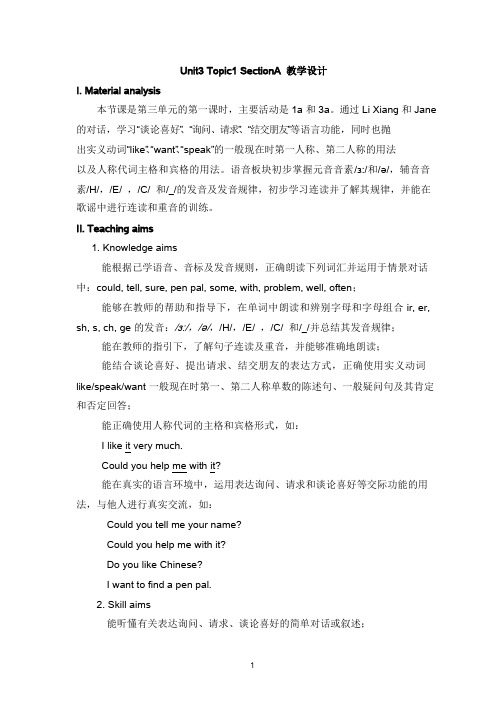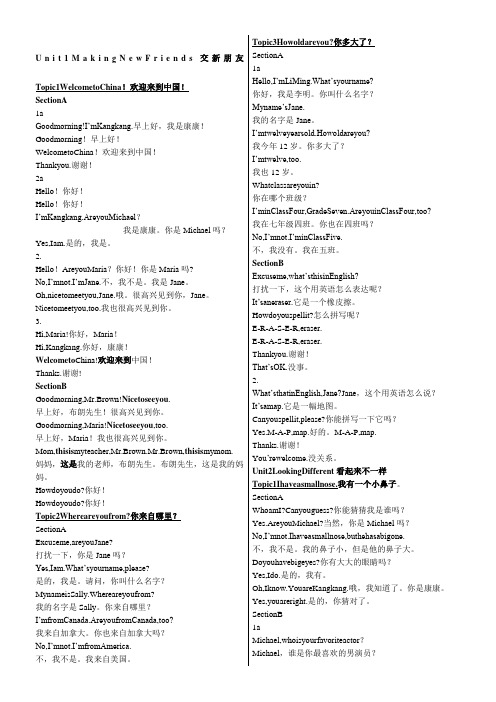仁爱版英语七年级上册Unit3Topic3SectionA
仁爱版英语七年级上册Unit3Topic1SectionA教学设计

2.培养学生尊重他人、关爱家人的价值观,让他们学会珍惜亲情、友情。
3.培养学生的团队协作精神,使他们学会与人沟通、交流,共同解决问题。
4.培养学生具有全球意识,了解不同国家文化背景,拓展国际视野。
5.引导学生树立正确的价值观,关注社会现象,提高社会责任感。
三、教学重难点和教学设想
(一)教学重难点
1.重点:本节课的核心词汇和句型,如:friend, family, mother, father, brother, sister等,以及一般现在时的用法。
难点:在实际对话中正确运用所学的词汇和句型,进行流畅的口语表达。
2.重点:学会使用一般疑问句和特殊疑问句进行家庭成员信息的询问。
2.教师提问:“Can you introduce your family members and their jobs?”,让学生尝试用英语介绍自己的家庭成员及其职业,为新课的学习做好铺垫。
3.教师播放一段关于家庭成员的英语歌曲,让学生在欣赏歌曲的同时,感受英语学习的乐趣,进而导入新课。
(二)讲授新知
1.教师呈现本节课的核心词汇,如:friend, family, mother, father, brother, sister等,并通过例句、图片等形式帮助学生理解和记忆。
2.教师讲解一般现在时的用法,结合家庭成员及其职业的例子,让学生学会用一般现在时描述家人及其特点。
3.教师教授一般疑问句和特殊疑问句的构成,如:“Is your father a doctor?”、“What does your mother do?”等,并引导学生进行实际操作,巩固所学知识。
4.关注学生个体差异,实施分层教学,满足不同学生的学习需求。
七年级英语仁爱版上册Unit3_Topic3_课时同步练(解析版)_

Unit3 Topic3 课时同步练一、基础巩固Ⅰ.单项选择。
1. —Help yourselves, kids!—______A. Me, too.B. Thank you.C. All right.D. That’s OK.【解析】B Help yourself/yourselves(to sth.)!常用在招待客人时,表示“请随便(吃/喝点……)”。
其答语为“Thank you./Thanks.”,故选B。
2. —Would you like ____ bananas?—Yes, please.A. a lotB. muchC. someD. lot【解析】C some一般用于肯定陈述句中,也常用于提建议或希望得到肯定回答的疑问句中;much接不可数名词;a lot修饰动词或形容词比较级,故选C。
3. —What would you like ____?—Some milk, please.A. eatB. to eatC. drinkD. to drink【解析】D would like接名词或动词不定式,由答语“some milk, please.”可知上句问的是想喝什么,故选D。
4. —What about some ____?—Good idea!A. apple juiceB. apple juicesC. apples juiceD. apples juices【解析】A juice是不可数名词,没有复数形式;apple修饰juice时用单数形式,故选A。
5. —What do you have ____ lunch?—I often have chicken ____vegetables.A. for; inB. for; withC. to; andD. to; of【解析】B have sth. for breakfast/lunch/dinner,表示“早餐/午餐/晚餐吃……”;介词with此处表示“带有……”,故选B。
仁爱版七年级英语上册Unit3知识点总结

仁爱版七年级英语上册Unit3知识点总结Unit 3: Getting XXXTopic 1: Basic Sentence Structures1.Asking for XXX:Excuse me。
could you please tell me your name?Sure。
my name is Jane.2.Asking for help:Could you help me with it?No problem.3.Asking about language proficiency:Does XXX?Yes。
he does./No。
XXX.4.Asking about the content of a letter:What does he say in the letter?5.Describing friendship:Jane。
Sally。
and I are good friends.6.Describing mutual help:We often help each other.7.Expressing different degrees of liking:Many students in our class like English a lot。
but I like it a little.What about you。
Sam?No。
I don't like English at all.Useful Phrases:9.Pen palXXX11.A lot12.Not。
at all13.Each other14.A little15.Very much16.A lot of17.Every dayPersonal Pronouns and Simple Present XXXXXX or things。
and they have ns in person。
singular or plural。
仁爱版英语七年级上册7A_Unit3_Topic1_SectionA_教学设计

Unit3 Topic1 SectionA 教学设计Ⅰ. Material analysis本节课是第三单元的第一课时,主要活动是1a 和3a。
通过Li Xiang 和Jane 的对话,学习“谈论喜好”、“询问、请求”、“结交朋友”等语言功能,同时也抛出实义动词“like”、“want”、“speak”的一般现在时第一人称、第二人称的用法以及人称代词主格和宾格的用法。
语音板块初步掌握元音音素/з:/和/ə/,辅音音素/H/,/E/ ,/C/ 和/_/的发音及发音规律,初步学习连读并了解其规律,并能在歌谣中进行连读和重音的训练。
Ⅱ.Teaching aims1. Knowledge aims能根据已学语音、音标及发音规则,正确朗读下列词汇并运用于情景对话中:could, tell, sure, pen pal, some, with, problem, well, often;能够在教师的帮助和指导下,在单词中朗读和辨别字母和字母组合ir, er, sh, s, ch, ge 的发音:/з:/,/ə/,/H/,/E/ ,/C/ 和/_/并总结其发音规律;能在教师的指引下,了解句子连读及重音,并能够准确地朗读;能结合谈论喜好、提出请求、结交朋友的表达方式,正确使用实义动词like/speak/want 一般现在时第一、第二人称单数的陈述句、一般疑问句及其肯定和否定回答;能正确使用人称代词的主格和宾格形式,如:I like it very much.Could you help me with it?能在真实的语言环境中,运用表达询问、请求和谈论喜好等交际功能的用法,与他人进行真实交流,如:Could you tell me your name?Could you help me with it?Do you like Chinese?I want to find a pen pal.2. Skill aims能听懂有关表达询问、请求、谈论喜好的简单对话或叙述;1能就表达询问、请求、谈论喜好等的话题进行交流;能正确地朗读对话,注意重音和连读;能写出表达询问、请求和谈论喜好的简单句子或者小短文。
2018年新版仁爱版七年级上册英语课文翻译

U n i t1M a k i n g N e w F r i e n d s交新朋友Topic1WelcometoChina!欢迎来到中国!SectionA1aGoodmorning!I’mKangkang.早上好,我是康康!Goodmorning!早上好!WelcometoChina!欢迎来到中国!Thankyou.谢谢!2aHello!你好!Hello!你好!I’mKangkang.AreyouMichael?我是康康。
你是Michael吗?Yes,Iam.是的,我是。
2.Hello!AreyouMaria?你好!你是Maria吗?No,I’mnot.I’mJane.不,我不是。
我是Jane。
Oh,nicetomeetyou,Jane.哦。
很高兴见到你,Jane。
Nicetomeetyou,too.我也很高兴见到你。
3.Hi,Maria!你好,Maria!Hi,Kangkang.你好,康康!Welcometo China!欢迎来到中国!Thanks.谢谢!SectionBGoodmorning,Mr.Brown!Nicetoseeyou.早上好,布朗先生!很高兴见到你。
Goodmorning,Maria!Nicetoseeyou,too.早上好,Maria!我也很高兴见到你。
Mom,thisis myteacher,Mr.Brown.Mr.Brown,thisis mymom. 妈妈,这是我的老师,布朗先生。
布朗先生,这是我的妈妈。
Howdoyoudo?你好!Howdoyoudo?你好!Topic2Whereareyoufrom?你来自哪里?SectionAExcuseme,areyouJane?打扰一下,你是Jane吗?Yes,Iam.What’syourname,plea se?是的,我是。
请问,你叫什么名字?MynameisSally.Whereareyoufrom?我的名字是Sally。
Unit3Topic3SectionA教案(大全五篇)[修改版]
![Unit3Topic3SectionA教案(大全五篇)[修改版]](https://img.taocdn.com/s3/m/c63e3c2676a20029bc642db6.png)
第一篇:Unit 3 Topic 3 Section A 教案黑龙江省哈尔滨五常市私立万宝中学校英语课程改革(七年级上)教师专用教案(Unit 3)Topic 3What would you like to drink?Section A (2课时)第1课时1. Help yourselves! 译为:请随便吃/喝!该句为主人招待客人用餐时的常用语。
如果被招待者是一个人,用help yourself; 若是两人或两人以上,用“Help yourselves.”另外help yourself to…译为“请随便吃/喝些……”▲【例句】请随便吃些苹果。
Help yourself to some apples. 我可以喝杯饮料吗?Can I have a drink, please? 请自用。
Help yourself.★【拓展】如果主人要请客人吃什么东西,则用Help yourself/yourselves to sth. ▲【例句】汤姆,请随便吃些橘子。
Help yourself/yourselves to some oranges, Tom.孩子们,请随便吃些苹果。
Help yourselves to some apples, boys. 2. I would like an egg and some fish. 译为:我想一个鸡蛋和一些鱼肉。
(1) would like 译为:要,想要,愿意,喜欢,希望。
would like 要用于婉转地提出请求、建议或某种看法,在意思上相当于want,但语气比want更委婉。
would like后面可以跟名词或代词,如果跟动词,一般是不定式形式(to do sth.)。
would like 在口语常说成’d like,不受主语人称和数的变化影响。
▲【例句】①我想要一个鸡蛋。
I’d like an egg. = I want an egg.②他想要喝果汁。
He would like to drink juice. = He wants to drink juice. (2) would like 的一般疑问句形式为: Would +主语+like…? Would you like…译为:“你想要……吗”用于礼貌地提出建议或发出邀请,有时含有请求的意味。
仁爱版七年级英语上册Unit3知识点总结
Unit3 Getting TogetherTopic1 基本句型1.Excuse me,could you please tell me your name? Sure,my name is Jane.2.Could you help me with it? No problem.3.Does he speak some Chinese? Yes,he does./No,he doesn`t.He speaks English.4.What does he say in the letter?5.Jane,Sally and I are good friends.6.We often help each other.7.Many students in our class like English a lot,but I like it a little.8.What about you,Sam? No,I don`t like English at all.词组9.pen pal10.help sb.with sth.11. a lot12.not...at all13.each other 14.a little15.very much16.a lot of17.every day1.人称代词的主格和宾格。
(1)主格的人称代词作句子中的主语。
e.g.We are good friends. 我们是好朋友。
It is my cat. 它是我的猫。
(2)宾格的人称代词作动词或介词的宾语。
e.g.We all like her very much. 我们都非常喜欢她。
Please help me with Chinese. 请帮助我学习汉语。
2.实义动词的一般现在时。
实义动词表示动作或状态,在句中能单独作谓语。
在一般现在时中,一般用动词原形,但如果主语是第三人称单数,动词必须用第三人称单数形式。
仁爱版七年级英语上册Unit1Topic3SectionA教学设计
(一)教学重难点
1.重点:本章节的重点在于让学生掌握家庭成员及相关职业的词汇,并能运用一般现在时介绍家庭成员的职业。
2.难点:
(1)正确运用一般现在时描述家庭成员的职业,注意主语为第三人称单数时动词的变化。
(2)在真实语境中,运用所学词汇和句型进行流畅的口语交流。
(二)教学设想
-教师纠正发音,引导学生跟读。
2.新课内容呈现:利用多媒体课件,呈现本节课的重点句型和词汇。
-教师呈现句型:“My father is a doctor.”,引导学生注意一般现在时的动词变化。
-学生跟读,模仿句型,并进行角色扮演。
3.口语练习:设计“家庭成员职业介绍”的口语活动,让学生在实际情境中运用所学。
五、作业布置
为了巩固本节课的学习内容,提高学生的语言运用能力,特布置以下作业:
1.口语作业:请学生录制一段家庭成员职业介绍的视频,要求使用本节课所学的句型和词汇。学生可以自由选择家庭成员作为介绍对象,注意发音准确、语法正确。
2.写作作业:根据课堂所学的句型和词汇,完成一篇关于家庭成员职业介绍的短文。要求不少于50词,内容完整、结构清晰。
3.交流分享:各小组选派一名代表,汇报本组的讨论成果。其他学生认真倾听,互相学习。
4.教师点评:对各小组的讨论成果进行点评,给予鼓励和指导。
(四)课堂练习,500字
在这一环节中,我将设计一系列课堂练习,帮助学生巩固所学知识,提高语言运用能力。
1.口语练习:设计家庭成员职业介绍的口语练习,让学生两人一组进行练习。
2.句型运用:学生能够运用所学句型介绍自己家庭成员的职业,如:“My father is a doctor.”、“My mother is a teacher.”等。
仁爱版七年级上册英语笔记 Unit3 Topic3-Unit4 Topic1知识点总结
U 3 T3—U4 T11.1)would like = wantwould like没有人称和数的变化I would like an egg.=I want an egg.He would like an egg.= He wants an egg.(would like不能加s)2)would like to do = want to doa. He would like to drink some water.(drink)=He wants to drink some water.b. She would like (visit) the Great Wall.=She the Great Wall.3)I would like=I’d like He would like=He’d like4)a. I’d like an egg.(一般疑问句) Would you like an egg?Yes,please./ No,thanks.b. He’d like a hamburger.he a hamburger?. / .5)Would you like some chicken?(用some 加强语气,表示强调)6)I’d like an egg.What would you like?He’d like some fish.he ?2.1)you—yourself(反身代词)2)yoursel f---yoursel ves(pl.)3.help yourself/yourselves to +n.:随便吃……a. Help yourself (you) to some chicken, Tom.b. Help yourselves (you) to some chicken, kids.4.1)可数名词[C]:有单数和复数的形式.2)不可数名词[UC]:一般没有复数的形式.3)常见的不可数名词有:milk,rice,fish(鱼肉),chicken(鸡肉),(apple/orange) juice,water,bread5.fish:1)作为“鱼” , 是可数名词.fish—fish(pl.)2)作为“鱼肉”, 是不可数名词.some fish6.chicken:1)作为“鸡” , 是可数名词.a chicken2)作为“鸡肉”, 是不可数名词.some chicken7.some + n.(pl.),some+ [UC]some eggssome fish/chicken/milk/apple juice/rice8.---Help yourselves.---Thank you.9.---Would you like…? ---Yes, please. /No, thanks.10.What/How about +sb(宾格)/sth?What about him/her/some milk?11.All right.行,好吧(表示对别人的建议表示赞同)---I’d like some rice and chicken.---All right.k for me.13.Me,too.14.表示建议:---What about …? ---Good idea.15.an ideaa good ideaHomework:1.I’d like a hamburger.(一般疑问句) a hamburger?(肯否回答) ./ .2.She’d like some orange juice.she ?3. , boys and girls.(随便吃些鸡肉吧)4.She likes it very much.(否)She it .5..(我想喝些牛奶).6.他们怎么样??Unit 3 T 3 Section B—D1.1)usually:70-80%,often:50-60%2)usually,often放在be之后,行为动词之前.I usually have breakfast at home.2.have…for breakfast/lunch/supper/dinner1)He usually has an egg and some milk for breakfast.2)We usually have some rice and chicken for supper.3.一日三餐前不加a/an/the,后不加s.What do you usually have for/ breakfast?4.1)He usually has some bread for lunch.What does he usually have for lunch?2)We usually have some juice and fish for dinner.usuallyfor dinner?5.have:1)有2)吃,喝:have milk/bread6.[UC]前面不加a/an/the,后不加s.He has / milk and/ bread for breakfast.7.What/How about +sb(宾格)/sth?8.with带着/有,(表示伴随关系)have chicken/fish with vegetables9.some rice10.three meals(餐):breakfast,lunch,supper/dinner11.food:[UC],食物的总称,作主语,谓语用单数.My favorite food is (be) chicken and fish.12.Chinese /English food13.wait(v.)—waiter(指人)(男服务员)---waitress(女服务员)14.take one’s orderMay I take your order?15.something to drink/eat1)修饰词如不定式(to do) ,形容词修饰something时,放在something之后.2)something:某事(肯定句)anything:任何事(否/疑问)nothing:没有什么事(表否定意思的陈述句)3)Would you like +something?Would you likesomething to eat ?16.[UC]表示数量的表达法:1)a glass of apple juice/watera bag of rice /milk2)a glass of apple juice---two/some glasses of apple juice3) a bag of milk---five bags of milk17.wait/just a moment18.Let me see.让我想一想.I see. 我明白了.19.1)Would you like some vegetables?2)some vegetables/rice20.something to drink21.banana juice----Section C1.eat out2.eat---eating(现在分词)3.would like to doWould you like to have (have) dinner with me?4.have / breakfast/lunch/supper/dinner5.with sb(宾格)6.Would you like to have lunch with him?7.Yes, I’d like/love to.(to不能省略)8.1)May/can I help you?=What can I do for you?2)情态动词may/can/could+动原May I help (help) you?9.sir—madam(对应词)10.What would you liketo eat (eat)?11.Why not+动原? =Why don’t you +动原?Why not study (study) with me? = Why don’t you study with me?12.表示建议:1)What about…? 2)Why not…?肯定回答:Good idea.13.Here you are.14.---Would you like sth to drink?---Yes,please./No,thanks.Section D1.in+地点: in China2.many+n(pl.)many friends3.1)all,bothall指三者或三者以上“都”both指两者“都”2)all,both放在be之后,行为动词之前They are all students.We all like school.4.be kind to sbThe teacher is kind to us.5.have dinner with them6.such as +若干例子7.Sichuan food8.be glad to do sthObama is glad to visit (visit) the Great Wall.9.1)here,there是介词,前不加介词.2)be here/thereI’m glad to be (be) here.10.let sb do sthLet me (I) see (see).Homework:1.他晚饭通常吃什么?he usually?2.你可以点菜了吗??3.Tom,为什么不随便吃些汉堡包呢,?,Tom?4.你想喝些什么东西吗?来两杯香蕉汁.Would you like?.5.She’s glad (be) there.6.I’d like (work) with you.7.Would you like something(say)?8.Why not (tell) him about it.= him about it.9.他对我很友善.He .10.I usually have some rice for lunch.usually for lunch?1.---Do you like…?---Yes, I like …very much/a lot/a little.(No, I don’t like …at all.)Section D1.at / homeHe has a dog at home.2.it’s, its(它是)(它的)a cat. name’s Mimi.3.Tommy =Tom4.Zhou Lan likes it a lot.= Zhou Lan likes it very much.(否)Zhou Lan doesn’t like it at all.5.some,anyShe has some pets.(否)She doesn’t have any pets.(疑问)Does she have any pets?6.1)人称代词:主格---宾格I—me,you-you,he-him,she-her,it-itwe-us,they-them2)形物代—名物代my-mine,your-yours,his-his,her-hers,its-its,our-ours,their-theirsThis is a girl. name is Lily. is twelve. We like .(Her,She,her)Unit 4 T1 Section A1.What can I do for you?=Can/May I help you?2.madam---sir(对应词)3.want to do = would like to do1)She wants to have milk and bread.=She would like to have milk and bread.2)Would you like a glass of apple juice?=Do you want a glass of apple juice?3)Would she like some vegetables?=Does she want any vegetables?4.clothes:衣服的总称,复数名词,作主语时,谓语用复数形式。
仁爱版英语七年级上册单词表
Unit 1 Topic 1 Welcome to China!1.好的,令人愉快的_______________2.早晨,上午___________3.我___________4.是___________5.欢迎___________6.到,对,向___________7.中国___________8.谢谢,感谢___________9.你,你们___________10.这(那)个,这(那)些___________11.美国___________12.英国___________13.喂,你好___________14.是___________15.是,同意___________16.不,不是,没有___________17.不,没有___________18.令人愉快的,友好的___________19.结识,遇见___________20.也,太,很___________21.感谢,谢谢___________22.遇见,看到,明白___________23.妈妈___________24.这个,这___________25.是___________26.我的___________27.老师,教师___________28.怎样,多少,多么___________29.做___________30.爸爸___________31.女士,小姐___________32.女士___________33.下午___________34.再见___________35.健康的,晴朗的___________36.和___________37.(口语)安然无恙,好,行___________38.在这里___________Unit1 Topic 2Where are you from1)原谅___________2)我(宾格)___________3)什么___________4)你的,你们的___________5)名字,名称___________6)请___________7)在(到)哪里___________8)来自,从___________9)加拿大___________10)美国___________11)日本___________12)英格兰___________13)他/她/它们___________14)谁___________15)他___________16)她___________17)看,看起来___________18)电话,号码,数字___________19)它___________20)很,非常___________21)非常,很;多少,许多,大量___________22)非常,很(词组)___________23)那,那个___________24)零___________25)一___________26)二___________27)三___________28)四___________29)五___________30)六___________31)七___________32)八___________33)九___________34)十___________35)她的___________36)家族,家庭___________ Unit1 Topic 31.What class are you in2.十二___________3.年___________4.…岁的,老的,旧的___________5.班级,课___________6.在…里(内,上),用…___________7.年级___________8.十一___________9.十三___________10.十四___________11.十五___________12.十六___________13.十七___________14.十八___________15.十九___________16.二十___________17.英语;英国的,英国人的___________18.橡皮,黑板擦___________19.地图___________20.钢笔,笔___________21.铅笔___________22.书桌.___________23.一(个,件……)___________24.拼写___________25.一(个,件……)___________26.能,会___________27.苹果___________28.玩具___________29.试,试图,努力___________30.再一次___________31.那些___________32.书,本子,预约,预订___________33.这些___________34.让___________35.帮助___________36.尺子___________37.小汽车,轿车___________38.蛋___________39.柑橘; 橙子,橘;橘黄色的___________40.公共汽车___________41.盒,箱___________42.现在___________43.学校___________44.他的___________45.相同的___________46.但是,可是___________47.朋友___________48.初级的___________49.高的;在高处,向高处___________50.初中___________Review of Unit 11)女孩___________2)我们___________3)学生___________4)讲,说,谈话___________I have a small nose.1.猜___________2.有,吃,喝___________3.小的___________4.鼻子___________5.有(第三人称单数形式)___________6.大的___________7.眼睛___________8.知道,认识___________9.正确的,右边的;右边___________10.耳朵___________11.头发___________12.头___________13.脸___________14.脖子___________15.嘴___________16.圆形的___________17.长的___________18.宽的___________19.最喜爱的;特别喜欢的(人或物)___________20.演员___________21.汉语的,中国人的;中国人,汉语___________22.Do 的第三人称单数___________23.胳膊;_______________24.手;___________26.脚,英尺___________27.短的,矮的___________28.男孩___________29.来;来到___________30.出生于,来自___________31.姐妹___________32.不同的___________33.小刀___________写出下列词的复数形式:1)egg___________2) banana___________3)bus___________4)box___________5)class___________6)watch___________7)baby ___________8)family___________9)boy___________10) monkey___________11)knife___________12)wolf ___________13)wife___________14)shelf___________15)foot___________16)man___________17)woman___________18)child ___________What does she look like1)黑色的;黑色___________2)金黄色的;浅色的___________3)蓝色的;蓝色___________4)颜色;给…着色;涂色___________5)粉红色;粉红色的___________6)红色;红色的___________7)紫色;紫色的___________8)棕色;棕色(的)___________9)灰色;灰色(的)___________10)黄色;黄色(的)___________11)绿色(的);___________12)白色;白色的___________13)给___________14)信,字母___________15)对不起,抱歉;难过的___________16)像;跟…一样;喜欢;喜爱___________17)高的___________18)会;将___________19)给,因为,对于___________20)年轻的___________21)男人___________22)成年女子,妇女___________23)雪人___________24)想要;需要___________25)买___________26)T恤衫___________28)一对,一双___________29)(表示所属,数量,其中)……的___________30)鞋___________31)外套;大衣___________32)连衣裙;___________33)裤子___________34)短裙___________35)手套___________36)向;在(几点钟),在(某处)___________37)看着___________38)照片___________39)强壮的___________40)幸福的,快乐的,高兴的___________41)下一个的;随后___________42)在……近旁,紧邻___________43)男式衬衫___________44)酷的;凉爽的___________45)另外,其他___________写出下列相应的物主代词和汉语意思1, my---__________()2, your--__________()3, our--___________()4, their--___________()5, his--_____________()Unit2 Topic 3Whose jacket is this1.我的___________2.谁的___________3.那么;然后_____________4.你的,你们的___________5.她的___________6.我们的___________7./他/它们的___________8.自行车___________9.猫___________10.我们的___________11.香蕉___________12.他/她/它们的___________13.夹克衫,短上衣___________14.想;认为,思考___________15.书包;___________16.婴儿;动物幼畜___________17.新的;___________18.同班同学___________19.衣服___________20.我们___________21.找到;___________22.他___________23.警察___________写出下列对应的词单数复数1,am/ is ___________2, this___________3, that___________4, I___________5, you___________6, he/ she/it___________7, my___________8, your___________9, his/ her/its___________句子单复数互相转换1.This is a box.______ ______ ______.2.That is my book.______ ______ _______ _________.3.Those are your shoes.______ ______ ______ ______.4.These are our pens.______ ______ ______ ______.5.They are pens.______ ______ ______ ______. 6.They are girls.______ ______ ______ ______.7.They are boys.______ ______ ______ ______.Unit 3 Topic 1Does he speak Chinese1)可以…;能___________2)告诉___________3)当然;确信的,肯定的___________4)一些___________5)关于;具有;和; 用___________6)问题___________7)很好地; 好吧,那么;健康的___________8)经常___________9)许多___________10)许多(词组)___________11)关于,大约___________12)居住,生活___________13)说;讲___________14)参观;拜访___________15)许多的;___________16)一点儿;稍许;小的___________17)一点儿(词组)___________18)因此,所以;如此,这么___________19)她/他/它们(宾格)___________20)各个,每个___________21)互相;彼此___________22)所有;全部___________23)一点也不;根本不___________24)读,朗读___________25)人; 人们___________26)每一个,每个___________27)一天,一日;白天___________写出下列对应的词1,old (反义词)_________2,same(反义词)_________3, have (动词的第三人称形式)_________ 4,be(动词的第三人称形式)_________ 5,I(宾格代词)_________6.,their(名词性物主代词)_________ 7,Jane ( 名词所有格)_________8,this (复数形式)_________9,those ( 单数形式)_________Unit3 Topic 2What does your father do1.到家;在家___________2.小孩,开玩笑___________3.高兴的;愉快的___________4.母亲___________5.父亲___________6.医生___________7.父(母)亲___________8.办公室___________9.工人___________10.司机___________11.农民___________12.厨师; 烹调,烹饪;___________13.护士___________14.给…看,出示,表明;演出,展示___________15.工作,运转;劳动___________16.医院___________17.餐馆___________18.在…上;关于___________19.农场___________20.教___________21.扮演,表演___________22.驾驶;开车___________23.婶母; 姨母;伯母;舅母;姑母___________24.叔;伯;舅;姨夫;姑父___________25.兄;弟___________26.长沙发___________27.祖父(母);外祖父(母)___________28.堂(表)姐妹;堂(表)兄___________29.女儿___________30.树___________31.家谱___________32.儿子___________33.可爱的,机灵的___________34.玩耍,演奏;戏剧___________35.它的,她的,他的___________36.爱,喜爱___________Unit3 Topic 3What would you like to drink1)你自己___________2)打算,想要(will的过去式)___________3)鱼;鱼肉;钓鱼___________4)鸡肉,鸡___________5)大米;稻米___________6)喝;饮料___________7)果汁___________8)牛奶___________9)主意___________10)水___________11)蔬菜___________12)面包___________13)汉堡包___________14)通常地___________15)早餐___________16)午餐___________17)晚餐___________18)食物___________19)可以;可能___________20)拿;乘坐;花费___________21)命令,顺序;点菜,组织___________22)先生___________23)某物,某事___________24)(玻璃)杯___________25)嗯___________26)吃___________27)在(到)外面___________28)为什么___________29)亲爱的,昂贵的___________30)友好的; 种, 类___________31)在;是___________Review of Unit 31.在那里;到那里___________2.去,走___________3.得到,到达___________4.动物园___________5.星期日___________6.需要___________7.狗___________8.盼望___________Unit 4 Topic 1What can I do for you1)商店; 购物___________2)夫人;女士___________3)试穿___________4)七十___________5)仅仅;只是___________6)认为;想起___________7)考虑___________8)任何东西(事物)___________9)意思是___________10)千克___________11)袋子___________12)一条(面包)___________13)(长方形)条,块; 酒吧___________14)一瓶的量;瓶子___________15)听,罐___________16)节省,攒钱,挽救___________17)巧克力___________18)可乐___________19)购物___________20)任何的,任一的___________21)重的___________(一到四十是学过的)22)一___________23)二___________24)三___________25)四___________26)五___________27)六___________28)七___________29)八___________30)九___________31)十___________32)十一___________33)十二___________34)十三___________35)十四___________36)十五___________37)十六___________38)十七___________39)十八___________40)十九___________41)二十___________42)三十___________43)四十___________44)五十___________45)六十___________46)八十___________47)九十___________48)百___________Unit4 Topic 2Would you like to cook with us1.空闲的;免费的___________2.发生,向上___________3.野餐___________4.给…打电话;称呼___________5.什么时候,何时,当……的时候___________6.(在)明天;明天___________7.唱歌___________8.歌;歌曲___________9.不得不___________10.放(风筝、飞机模型等);飞行___________11.风筝___________12.时间,次,回___________13.请求,邀请,询问___________14.回到(原处),往后;背部,后部___________15.晚上;傍晚___________16.路,道路,方式___________17.家庭作业___________Unit4 Topic 3What time is it now1)熊猫___________2)猴子___________3)狮子___________4)老虎___________5)象___________6)…点钟___________7)在…之后,超过,经过;过去,往事___________8)一刻钟;四分之一___________9)半;一半___________10)上午,午前___________11)聪明的;聪颖的___________12)动物___________13)小时___________14)以后,后来___________15)在今天,当今,今天,当今___________16)起床,起来___________17)肉类,(某种)食用肉___________18)兔___________19)Review of Units 3-420)如果,是否___________21)电子邮件___________22)下午,午后___________。
- 1、下载文档前请自行甄别文档内容的完整性,平台不提供额外的编辑、内容补充、找答案等附加服务。
- 2、"仅部分预览"的文档,不可在线预览部分如存在完整性等问题,可反馈申请退款(可完整预览的文档不适用该条件!)。
- 3、如文档侵犯您的权益,请联系客服反馈,我们会尽快为您处理(人工客服工作时间:9:00-18:30)。
(1)抄写并背诵Section A。 (2)周报第1课时。 (3)预习Section B。
你自己 你们自己 请随便吃点/喝点 打算,想要 关于 …怎么样? 行了,好吧 吃,喝 吃 喝 对。。。来说 主意,想法 好主意
yourself yourselves help oneself (to) would about What about…?How about…? all right OK have eat drink for idea good idea
Would you like +some +名词? 你想要...吗?(提议或邀请) Yes,please./ No, thanks.
希望得到肯定 回答
What would you like to drink? 你想要喝什么?
I would like +some+名词/ I'd like...
juice
hamburgers
Yes, please. / No, thanks. eggs milk chicken
Useful Expressions:
1.-Help yourselves. -Thank you. 2.-What would you like to drink? -I would like... 3.-Would you like some eggs? -Yes, please./No, thanks. 4. -What about you?
你想要一些...吗? 2. 肯定回答时用“Yes, please.” 3. What about…?=How about…? 询问别人对某事的看法、意愿等。 4. =OK.好的 你喜欢喝什么吗?
5. sth. for sb. 给某人某物 6. 常用于口语,表示说话人 与前一个人所说情况一致。
1b
Group work
bananas
rice
bread
vegetable
chicken
rice
补全对话:
Help yourself Kang: ____________! Michael: thank you. I would like an egg and... Would you like some eggs Kang: ________________________, Maria? Maria: No, thanks . I ‘d like some chicken. What about you Kang: ______________, Jane? Jane: Rice and chicken, please. Kang: All right. What would you like to drink ________________________? for Jane: Apple juice, please. I like it very much. Maria:Milk ____ me, please. Me, too =I’d like some milk, too. Michael: _______.
Complete the table(一览表;桌子) and then act out the conversation above. Name Food Drinks
Michael
Maria
an egg and some fish
some chicken
milk milk
Jane
rice and chicken apple juice
B: No, thanks . I don’t like it at all. A: What about some ____? milk B: Good idea .
Welcome to KFC! What would you like (to eat/drink )? I’d like …
Would you like …?
游戏规则: 1.四组为一队。 2.请根据蘑菇上单 词是可数还是不可 数,判断超级玛丽 是否JUMP(跳跃), 可数名词加分,不 可数名词减分。判 断正确率越高组为 胜者。
banana
+1
rice
-1
fish
-1
water
-1
juice
-1
egg
+1
bread
-1
milk
-1
chicken
-1
2 Listen and fill in the blanks
(录音)
A: What would you like to have? B: I’d like some _____and chicken ______. rice A: Would you like some orange ____? _____ juice
Family Introduction
Key Words
my name come from a student in ... ... years old a photo of... the young man in ... the young woman in ... work in...
k
f d h
c
g j b
e
a
i
可数名词
只有可数名词有单复数的变化。 some + 可数名词复数
名词
eggs some vegetables rice
不可数名词 some + 不可数名词
不可数名词没有复数形式, 不能在它后面加-s。
Countable Nouns: 可数名词
a banana 单 a hamburger 数 a vegetable an egg some bananas 复 some hamburgers 数 some vegetables some eggs
Uncountable Nouns: 不可数名词
some water some juice some fish some chicken some rice some bread some milk
(影片)
jɔ:'selvz
非常
(录音1) 1.请随便吃喝。客人=1时,用Help yourself. 客人≥2时,用Help yourselves.
vegetable
+1
hamburger
+1
rice
-1
apple
+1
fish
-1
hamburger
+1
பைடு நூலகம்
juice
-1
